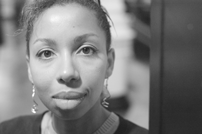By Jerry Tallmer
It’s not sex. Well, it’s sex in disguise—disguised even from Mrs. Lemarchand. It’s subliminal sex, one female determined to absorb and dominate another, who does not respond.
And that’s what interested Marie NDiaye (pronounced something like Dee-ahl) when, six years ago, she set about writing “Hilda.”
Café-au-lait gorgeous and slim, even skinny in blue jeans, an old green sweater, dangling silver earrings, and minimal eyeglasses, Ms. NDiaye brought out half a word of English here in New York the other day, then turned to the production company’s Joyce Maio, who relayed in English the following, answer and all else below:
“I wanted to describe the relationship of power between human beings. A character, a woman [Mrs. Lemarchand], who’s strong rather than douce, soft, weak. Because women are often portrayed very compassionate, and I did not want to write about that.”
What made you put it in terms of mistress and maid?
“Because it was the easiest. A very basic relationship, no? Which also makes possible a kind of intimacy, a personal relationship. In France, to have extra help is very costly, so no, I never had a maid. But I have met a lot of people who have maids.”
One wonders: Does Mrs. Lemarchand really have all that power at the end of the play? Whatever it is, it’s not satisfying for her, is it?
“Yes, it’s not enough,” said Marie NDiaye. “She wants more. She wants to be loved and admired.”
Who does not, Mlle. NDiaye?
The reply: a Mona Lisa smile, and silence.
The playwright’s husband, Jean-Yves Cendrey, is a writer himself. Who does the cooking chez vous?
“The two of us.”
Their children are a daughter who is now 14, a son, 12, and another son, 8.
Yes, their mother has indeed read and appreciated (but has never seen) Jean Genet’s famous 1946 drama “Les Bonnes” (“The Maids”), another pressure-cooker struggle of power and sex between employer and employees—“but the point of view there was more that of the maids, whereas I was more interested in the mistress.”
Did Ms. NDiaye—the daughter of a white French mother, and a black father from Senegal—also know Genet’s foreboding, superheated “The Blacks”?
“Yes.”
And?
A wobble of the hand expressed something less than admiration.
Another play of hers, written two years after “Hilda,” is “Papa Doit Manger.” It’s about her parents, she said, and their relationship with their child. It was done at France’s Comédie-Française, with a black actor named Bakary Angare in the lead—“the first black actor ever accepted into the Comédie-Française.” She herself is “only the second woman writer, black, red, or white” ever elected to that august body. The other one was Marguerite Duras.
NDiaye’s 2001 novel “Rosie Carpe” won the equally august Prix Femina.
What’s it about?
“About an ordinary woman who throughout the 20 years of her life tries to change her life.”
Does she succeed?
“No!!” sprang from the lips of this extraordinary and extraordinary-looking young woman who, the daughter of Simone Rousseau and engineer Tidiane NDiaye, was born in Pithiviers, in central France, on June 4, 1967, and lives now in the village of Barie, near Bordeaux.
She met her father for the first time in her life, she said, when she was 10 – “and just twice in my life after that. I don’t know him.” That first meeting had been “très ordinaire.” He came to the house and that was that.
Had being a person of color been of any consequence in her growing up? Had it been difficult?
“In my case, not so difficult. I have a brother by the same father. We were very good students, very polite, and not aggressive. However, we did grow up at a time when mixed marriages were not common there. What was difficult was to make the other children realize we were not adopted, my brother and I.”
It was at a reading in London that the American producer Laura Pels first learned of the existence of “Hilda.” She liked it so much, she gave it a run at her Théatre de l’Atelier in Paris, commissioned Erika Rundle to do an English translation, and brought the play, first to a reading at the Public Theater in New York, then to ACT in San Francisco, then to the Kennedy Center in Washington, and now here.
The director from ACT to now has been Carey Perloff, and the three actors are Ellen Karas as Mrs. Lemarchand, Brandy Burre as Hilda’s sister, Corinne, and Michael Earle as Hilda’s husband (Hilda herself never appears). A full London production is scheduled for 2006.
Meanwhile, Paris has been burning, along with many other cities—and many automobiles—in France. The rioters are generally young, poor, and not white. Any thoughts, Ms. NDiaye?
“It was imminent something like this would happen. But it’s a shame it’s being done in this delinquent manner. It’s not to a constructive end. There are some deep issues, but I’m afraid all this might eventually help the extreme right.”
That is to say, it’s no time for comedy.
google_ad_client = “pub-6226499064891091”;
google_ad_width = 468;
google_ad_height = 60;
google_ad_format = “468x60_as”;
google_ad_channel =”0606561524″;
google_color_border = “336699”;
google_color_bg = “FFFFFF”;
google_color_link = “0000FF”;
google_color_url = “008000”;
google_color_text = “000000”;
//–>
src=”https://pagead2.googlesyndication.com/pagead/show_ads.js”>
WWW Downtown Express































